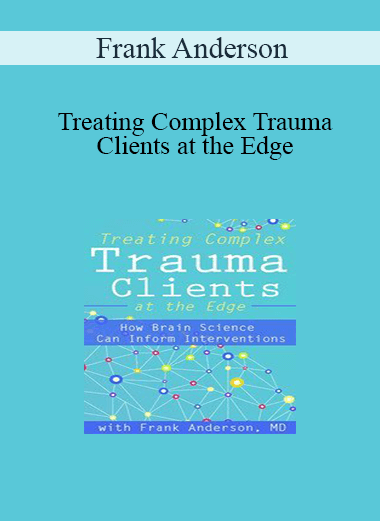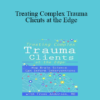$119.99 Original price was: $119.99.$24.00Current price is: $24.00.
[Instant Download] – Immediately deliver the download link after receiving the payment
 Purchase this course you will earn 24 Points worth of $2.40
Purchase this course you will earn 24 Points worth of $2.40Elevate your skills with the Frank Anderson – Treating Complex Trauma Clients at the Edge: How Brain Science Can Inform Interventions course, available for just $119.99 Original price was: $119.99.$24.00Current price is: $24.00. on Utralist.com! Browse our curated selection of over 60,000 downloadable digital courses across diverse Uncategorized. Benefit from expert-led, self-paced instruction and save over 80%. Start learning smarter today!
[Instant Download] – Immediately deliver the download link after receiving the payment
Purchase Frank Anderson – Treating Complex Trauma Clients at the Edge: How Brain Science Can Inform Interventions courses at here with PRICE $119.99 $24
- Faculty:
- Frank Anderson
- Duration:
- 2 Hours 6 Minutes
- Format:
- Audio and Video
- Copyright:
- Mar 22, 2018
Description
| Manual – Treating Complex Trauma Clients at the Edge (1.91 MB) | 16 Pages | Available after Purchase |
Outline
Experiential Treatments – Integrating neuroscience and psychotherapy
- Necessity of utilizing physical, emotional and relationship aspects in therapeutic intervention
Problems with traditional phase oriented treatment
- Negative evaluation of symptoms – ignoring their protective function
Internal Family Systems
- Understanding symptom presentation as positive efforts pushed to extremes
- Welcoming and integrating all parts of an individual
- Identifying intent of symptomology, importance of avoiding shaming
Redefining trauma related diagnoses and integrating overactive protective mechanisms
- Disorganized attachment
- Borderline Personality Disorder, Dissociative Identity Disorder
Therapist factors – vulnerabilities
- Impact of therapist parts acting as separately as the clients we work with
- Responding effectively to personal triggers
Symptoms of post trauma
- Hyperarousal, hyperarousal, psychic wounds
- Importance of obtaining permission before addressing psychic wounds
Experiential exercise – self-awareness, response to triggers
Mind-brain relationships
- Neuroplasticity, neural integration
- Neural networks associated with trauma
- Implicit nature of trauma memories
Autonomic nervous system
- Role of cortisol
- Sympathetic hyper-arousal
- Characteristics of extreme symptom activation and mixed states
Therapeutic responses
- Choosing compassion or empathic responses
- Providing auxiliary cognition
- Strategies to avoid contributing to hyperarousal
- Top down strategies to separate or unblend
Case presentation – example of permission seeking, direct access and unblending
Polyvagal Theory
- Dorsal and ventral branches
- Activating strategies, responding to hypo-arousal, blunting
Faculty

Frank Anderson, MD Related seminars and products: 7
Frank Anderson, MD, completed his residency and was a clinical instructor in psychiatry at Harvard Medical School. He is both a psychiatrist and psychotherapist and specializes in the treatment of trauma and dissociation. He is passionate about teaching brain-based psychotherapy and integrating current neuroscience knowledge with the IFS model of therapy.
Dr. Anderson is a lead trainer at the IFS Institute with Richard Schwartz and maintains a long affiliation with, and trains for, Bessel van der Kolk’s Trauma Center. He serves as an advisor to the International Association of Trauma Professionals (IATP) and was the former chair and director of the Foundation for Self-Leadership.
Dr. Anderson has lectured extensively on the Neurobiology of PTSD and Dissociation and wrote the chapter “Who’s Taking What” Connecting Neuroscience, Psychopharmacology and Internal Family Systems for Trauma in Internal Family Systems Therapy – New Dimensions. He co-authored a chapter on “What IFS Brings to Trauma Treatment in Innovations and Elaborations in Internal Family Systems Therapy” and recently co-authored Internal Family Systems Skills Training Manual.
Dr. Anderson maintains a private practice in Concord, MA.
Speaker Disclosures:
Financial:
Frank Anderson maintains a private practice. He receives a consulting fee from the Center for Self Leadership. Dr. Anderson receives a speaking honorarium from PESI, Inc.
Non-financial: Frank Anderson is the President of the Foundation for Self Leadership.
Purchase Frank Anderson – Treating Complex Trauma Clients at the Edge: How Brain Science Can Inform Interventions courses at here with PRICE $119.99 $24
Cultivate continuous growth with the Frank Anderson – Treating Complex Trauma Clients at the Edge: How Brain Science Can Inform Interventions course at Utralist.com! Unlock lifetime access to premium digital content, meticulously designed for both career advancement and personal enrichment.
- Lifetime Access: Enjoy limitless access to your purchased courses.
- Exceptional Value: Benefit from savings up to 80% on high-quality courses.
- Secure Transactions: Your payments are always safe and protected.
- Practical Application: Gain real-world skills applicable to your goals.
- Instant Accessibility: Begin your learning journey immediately after buying.
- Device Compatible: Access your courses seamlessly on any device.
Transform your potential with Utralist.com!
Related products
Uncategorized
Managing Geriatric Behaviors: Wandering, Aggression, Malnutrition and More – Steven Atkinson
= 35 Points
Uncategorized
= 85 Points
Uncategorized
= 35 Points
= 72 Points
= 125 Points
Uncategorized
Managing Patient Emergencies: Critical Care Skills Every Nurse Must Know – Dr. Paul Langlois
= 85 Points
= 85 Points
Uncategorized
= 85 Points

![[Audio] IC04 Professional Resources Day Workshop 04 - Self-Exploration: Cultivating Humility - Steve Andreas](https://utralist.com/wp-content/uploads/2023/04/Audio-Only-IC04-Professional-Resources-Day-Workshop-04-Self-Exploration-Cultivating-Humility-Steve-Andreas-M.A-100x100.png)



